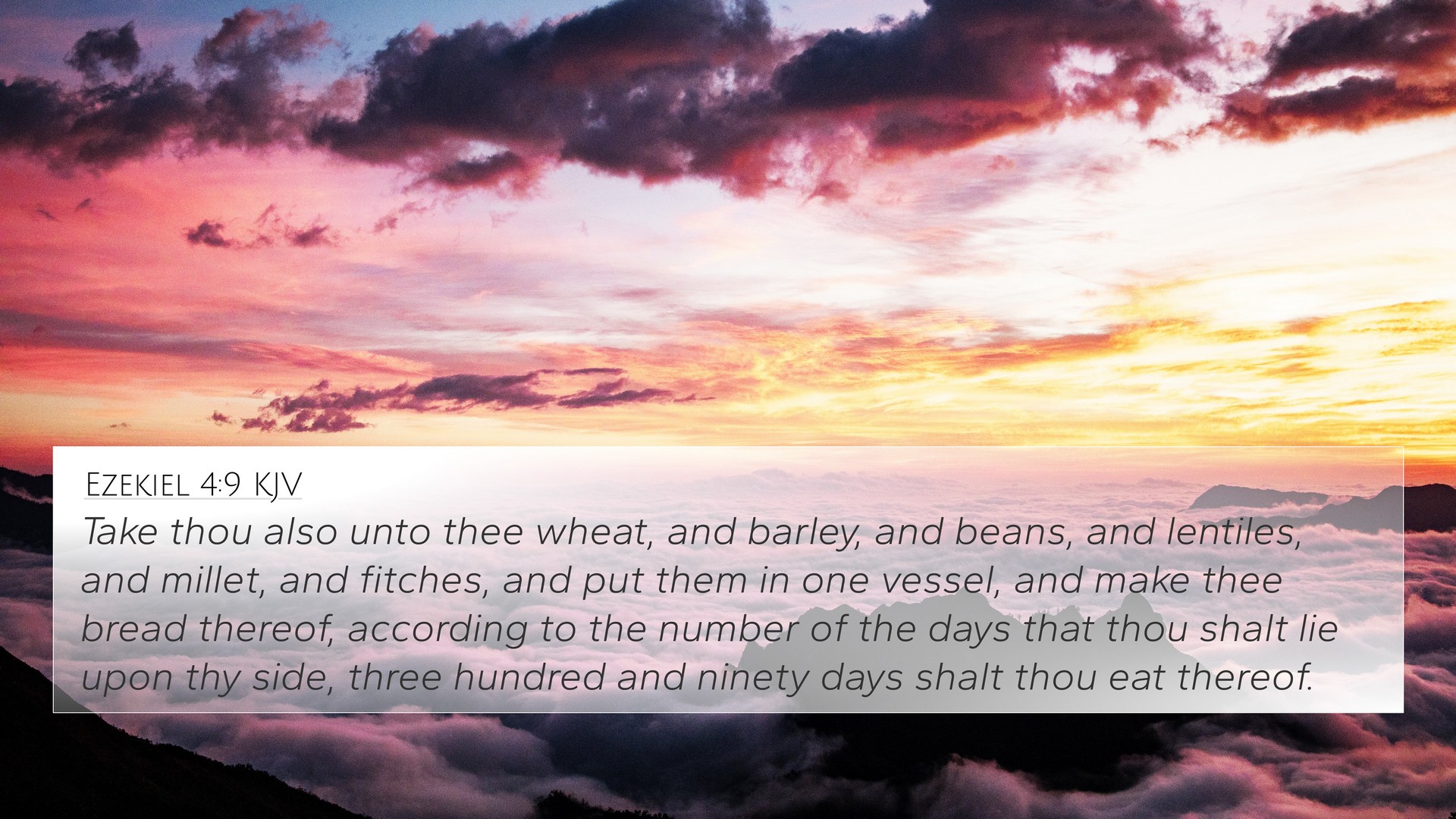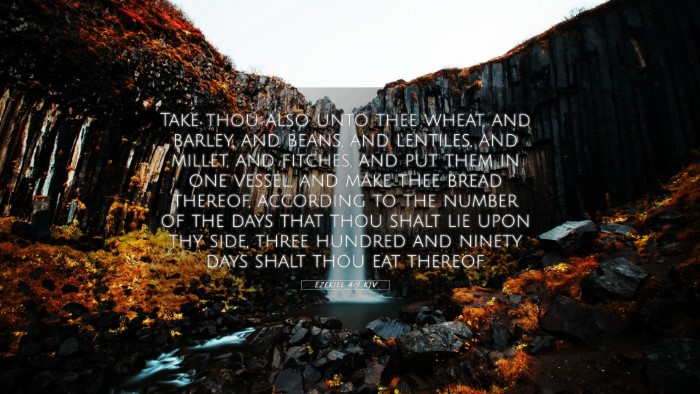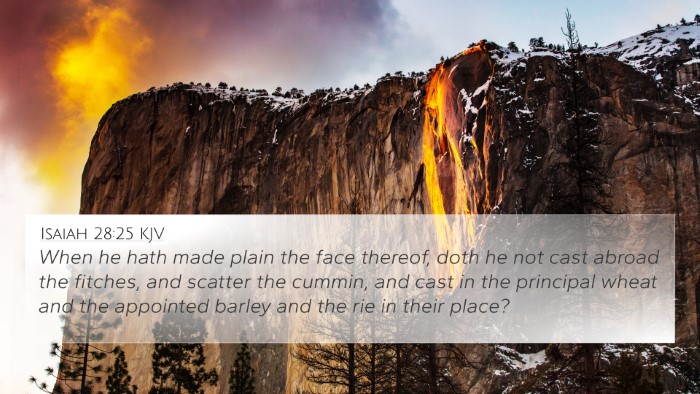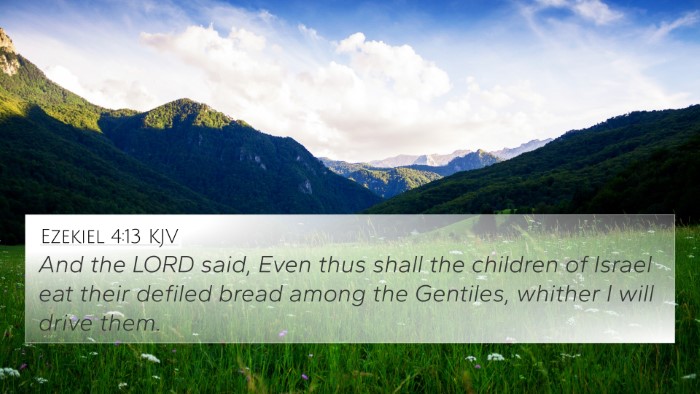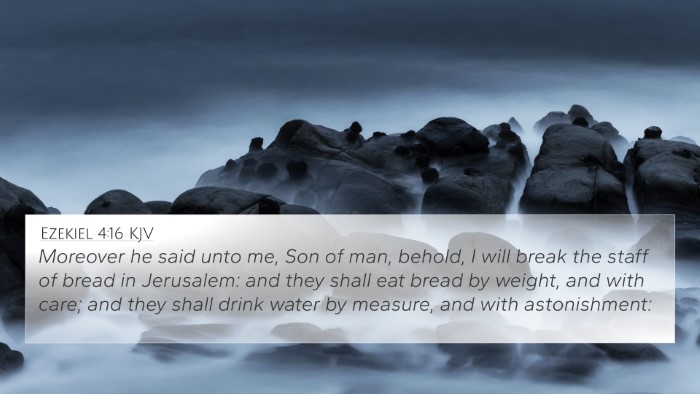Ezekiel 4:9 - Summary and Interpretation
Ezekiel 4:9 reads: “Take also unto thee wheat, and barley, and beans, and lentils, and millet, and spelt, and put them in one vessel, and make thee bread thereof, according to the number of the days that thou shalt lie upon thy side, three hundred and ninety days shalt thou eat thereof.”
Overview
This verse is a part of a prophetic act performed by Ezekiel, which has both literal and metaphorical significance. It encompasses themes of judgment, repentance, and the consequences of sin, while also embodying the sustenance that God provides even during a time of discipline.
Meaning and Significance
The elements in Ezekiel 4:9 symbolize various aspects of the Jewish diet and life during the ancient times. The selection of grains and legumes signifies preparation, survival and God's provision during dire circumstances.
Details from Commentaries
- Matthew Henry:
Matthew Henry highlights that this act symbolizes the impending judgment upon Israel and serves as a metaphor for their sustenance during a period of affliction. The specific instruction to use varied grains reflects the reality of scarcity and hardship faced by the people.
- Albert Barnes:
Albert Barnes elaborates on the importance of each type of grain mentioned, noting that they represent the nurturing nature of God's provision even as He disciplines His people. He emphasizes the spiritual implications attached to being sustained by God even amidst trials.
- Adam Clarke:
Adam Clarke points to the prophetic nature of the act, stating that it foreshadows a period of testing. He draws connections to the history of Israel, explaining how these actions serve as a reminder of God’s seriousness regarding their covenant with Him.
Connections and Cross-References
This verse can be linked with several other scriptures that enhance our understanding of its themes. Here are 10 cross-references to consider:
- Deuteronomy 8:3: “And he humbled thee, and suffered thee to hunger, and fed thee with manna, which thou knewest not, neither did thy fathers know; that he might make thee know that man doth not live by bread only, but by every word that proceedeth out of the mouth of the Lord doth man live.”
- Isaiah 3:1: “For behold, the Lord, the Lord of hosts, doth take away from Jerusalem and from Judah the stay and the staff, the whole stay of bread, and the whole stay of water.”
- Matthew 4:4: “But he answered and said, It is written, Man shall not live by bread alone, but by every word that proceedeth out of the mouth of God.”
- John 6:35: “And Jesus said unto them, I am the bread of life: he that cometh to me shall never hunger; and he that believeth on me shall never thirst.”
- 1 Kings 17:12-15: “And she said, As the Lord thy God liveth, I have not a cake, but a handful of meal in a barrel, and a little oil in a cruse: and behold, I am gathering two sticks, that I may go in and dress it for me and my son, that we may eat it, and die.”
- Psalm 37:25: “I have been young, and now am old; yet have I not seen the righteous forsaken, nor his seed begging bread.”
- Jeremiah 14:3: “And their nobles have sent their little ones to the waters: they came to the pits, and found no water; they returned with their vessels empty; they were ashamed and confounded, and covered their heads.”
- Ezekiel 5:16: “When I shall send upon them the evil arrows of famine, which shall be for their destruction, and which I will send to destroy you: and I will increase the famine upon you, and will break your staff of bread.”
- Revelation 6:6: “And I heard a voice in the midst of the four beasts say, A measure of wheat for a penny, and three measures of barley for a penny; and see thou hurt not the oil and the wine.”
- Matthew 6:11: “Give us this day our daily bread.”
Thematic Connections
The themes in Ezekiel 4:9 echo throughout both the Old and New Testaments, highlighting God's role as provider, sustainer, and the importance of recognizing our dependence on Him. Furthermore, the notion of bread being a symbol of sustenance ties into the narratives of Jesus as the Bread of Life.
Researching Bible Verse Connections
For those seeking to engage deeper in Bible verse cross-references, utilizing bible concordance tools can be immensely helpful. These resources allow for a more comprehensive understanding of how various scriptures relate to one another, facilitating a bibliographical cross-reference guide for personal study or sermon preparation.
Conclusion
In conclusion, Ezekiel 4:9 offers rich insight into the character of God as a provider and the gravity of the covenant with Israel. By cross-referencing with other biblical texts, one can explore the deeper meanings and current applications of being sustained by God's word and provision during times of hardship.
